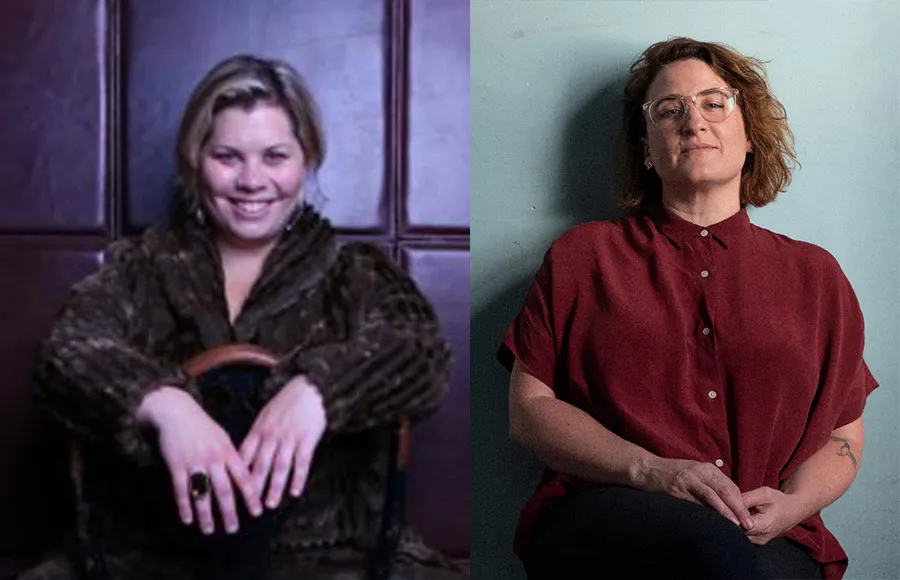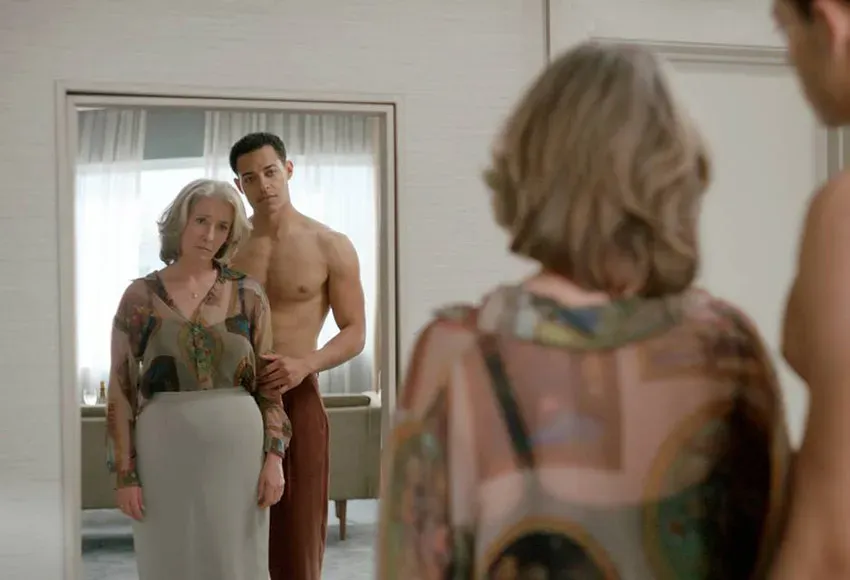Good Luck to You, Leo Grande writer Katy Brand and director Sophie Hyde on sex, gender, alter egos, and finding truth in fantasy
It started with a single idea: a lone woman, in her late fifties, maybe early sixties, anxiously waiting in a hotel room for a young male escort to knock on the door.
"I don't write down all my ideas," admits comedian, actor, and screenwriter Katy Brand candidly. "I just work on the basis that if [an idea] is genuinely good enough, it'll stick around and I'll remember it. If it sticks around for long enough, then I'll start working on it. This was one of those ideas.
"I had this very strong image of Nancy waiting, having done this thing that she always said she'd do, and now it's going to happen – and she's terrified. Then there's the knock at the door. It opens and there he is."
This is where the seeds of the May-December dramatic comedy Good Luck to You, Leo Grande were planted. The story begins with recently widowed Nancy Stokes (Emma Thompson) in that very hotel room, waiting for escort Leo Grande (Daryl McCormack) to arrive. What follows is a four-part mystery in which the two keep coming back together to explore, not just their bodies but what it means to make an authentic human connection as well.
But it was the central mystery of what would happen once that door did open and Leo Grande walked into the hotel room that got Brand excited and kept her writing. "I just wanted to hear them talk," she said with a smile. "I wanted to hear what they would say. I wanted to write a comedy about two interesting people in an unusual situation. I wanted to talk about themes about pursuing our own sexual pleasure, why we feel guilty and ashamed about that, and also this vocational aspect of sex work that some sex workers have. I've always found that really interesting."
It didn't take much convincing for 52 Tuesdays and Animals filmmaker Sophie Hyde to come on board the project. "It was the middle of the pandemic and I was in Australia," she explained, "and we couldn't leave Australia at the time. I got this email [saying] there was a film they wanted me to consider. It's a woman, and she wants to have good sex for the first time in her life. She's been unsatisfied and hires a sex worker. And the woman's going to be Emma Thompson, and it's all basically in one room.
"I was like, yeah, let's do it. Just seemed like magic. That's an irresistible combination, and I know how smart Emma is and also how emotional. Very quickly I was talking to Katy and Emma about what else could we could do, because it was a very early draft [of the script]. There was also so much potential in this idea: sex, power dynamics, etc. It was exciting."
For Brand, it was important that Nancy never be the butt of any joke. This was key. "There weren't going to be any jokes where the audience was laughing at [either of] them," she stated emphatically. "If Nancy does something that's a bit ridiculous, then let's have Leo laugh at her in the room, but in a nice way. Let's find the ridiculousness and let's have them [Nancy and Leo] cultivate that. It's not just us finding them funny; they find each other funny. That was something I wanted to make sure happened. This was quite important to me."
This was something the director was immediately on board with right from the first scene. "Katy had that opening scene nailed," says Hyde. "The whole opening meeting is very similar to the first draft. Katy had this idea of Nancy pacing in the hotel room, having made this decision, and so already it all felt quite physical. Emma is just so skillful that she has an ability to create that buttoned-upness but without it feeling clichéd.
"Emma knew the character. She felt clear about that really quickly. Even in the first read-through, I was like, put the camera up. Let's go. But Emma was like all of us. She wanted to work further and go further into what it could be, not just do the first version of her performance."

Writing the screenplay
The writer did the one thing you're never supposed to do when crafting a screenplay: she wrote the character for a specific actor to portray without knowing if they'd even read her work, let alone sign on to make the film. But she was undeterred.
"Her voice did inspire it," Brand said, laughing.
"The more I dared to [imagine] Emma say the lines, the more I enjoyed writing more lines, because I just thought, this line is going to be so funny when she says it," explained Brand. "I thought, she's going to play this so perfectly, comedy to drama, all of it.
"But I always knew that, while I was really enjoying writing this with Emma Thompson's voice in my head, no one was ever going to see it. I thought maybe I'd put it on in a little theater somewhere."
The screenwriter couldn't have been more wrong on that front. "I sent it to [producer] Debbie Gray," Brand recollected, "and she immediately said, 'Let's make this.' At that point I admitted I did kind of write it for Emma Thompson. But I knew Emma. I'm friends with her, and she's very supportive and encouraging. But the professional boundary is quite important to me. You don't just run up to people of Emma's stature and shout, 'I've had an idea!'
"It was Debbie who said it would be odd not to send [the script] to her. She thought I should at least give her the chance to say no. Emma came back very quick and very strong and just said, 'We're going to do this.' At that point, I was sort of paralyzed with amazement and just sat there reading the email over and over again."
Creating Leo
With Thompson on board, the next obvious challenge was finding a young actor who could go toe to toe with the two-time Academy Award winner. This led them to newcomer Daryl McCormack. "I've always been interested in alter egos," said Brand. "I love hip-hop music. I love the creation of a person in front of the person. I think my experience as a stand-up comedian – knowing that sometimes you have to go on stage when everything in your life is falling apart and still make everybody laugh, because that's what they're paying for you to do – inspired the creation of Leo Grande.
"When you're a touring comedian, you can almost reinvent yourself every night with a different group of strangers. Some people find that very intoxicating. You just sort of be your best self, be your best version, be the most professional. I knew Leo should be very, very good at his job. That's the point initially. He has quite a particular talent for it.
"But I think there's these little points where the conversations [between Nancy and Leo] turn, and there are opportunities for things to go a bit deeper. They're both taking each other, and themselves, by surprise. Leo develops more over [the course of] the film. You start to see more underneath, as the character relaxes, even when he's still being professional. I think that's a testament to Daryl's talent."
Hyde went further: "The opening bit, where Leo's on the street, we added that in," she explained. "It's a reminder that he comes from somewhere. He's not just there to service Nancy in terms of the story. He has a life that we might not get access to, because of the formal constraints of the project and because he's doing his job. I wanted to draw a little bit of attention to that.
"There is an amazing documentary theorist, Trinh T. Minh-ha. She talks about that we should always point outside the frame, that we shouldn't try and put everything in the frame. To me, that's what is important for a character like Leo. There's more going on. There's more under the surface. He has to do that beautiful thing where he's performing a role, but he's also present and honest and real."
"That was fun for Daryl, I think," Hyde said with a smile. "Like when Leo is performing for Nancy, and his anxieties or whatever kind of sneak through. When he cannot shut his mouth and has to call Nancy out on something, and that turns out to be a good thing in their relationship. All of that made it even more important that Leo had a life outside the hotel room."
What audiences might take from the film
With the film hitting Hulu, even though the picture was a success at the Sundance Film Festival back in January, Brand is excited about the potential of so many eyes seeing it in such a big way. "I think we're all really proud of it," she happily proclaimed. "I hope that people find it funny. I hope they find it honest and moving, and maybe [it] sparks some sort of conversation that they want to have.
"But if it doesn't, that's fine. If people want to just enjoy it as a comedy about two interesting people in an interesting situation, that's fine with me, too. Everything I've ever done, there've always been people who like it, [and] people who don't like it. I don't mind any of that. I'm just enjoying being part of the storytelling community."
Hyde echoed many of those same sentiments. "I have loads of ideas about the movie and things that I think are important," the director admitted. "Those include the idea of pleasure and that it's something worth pursuing. Certainly there are these ideas about our body as things that we are in, that they're our home to maintain. These are really important things for me.
"But in all honesty, I just like it when people start talking afterward. They're going to have different reactions. I want people to be able to speak frankly about how we treat each other and how we treat ourselves, about sex and intimacy. I hope people can remember that they don't have to be put into these boxes or accept these boxes all of the time. That they can find out what they like and who they like, and it doesn't have to be part of a preordained set of rules for their lives."
Good Luck to You, Leo Grande is now streaming on Hulu.


